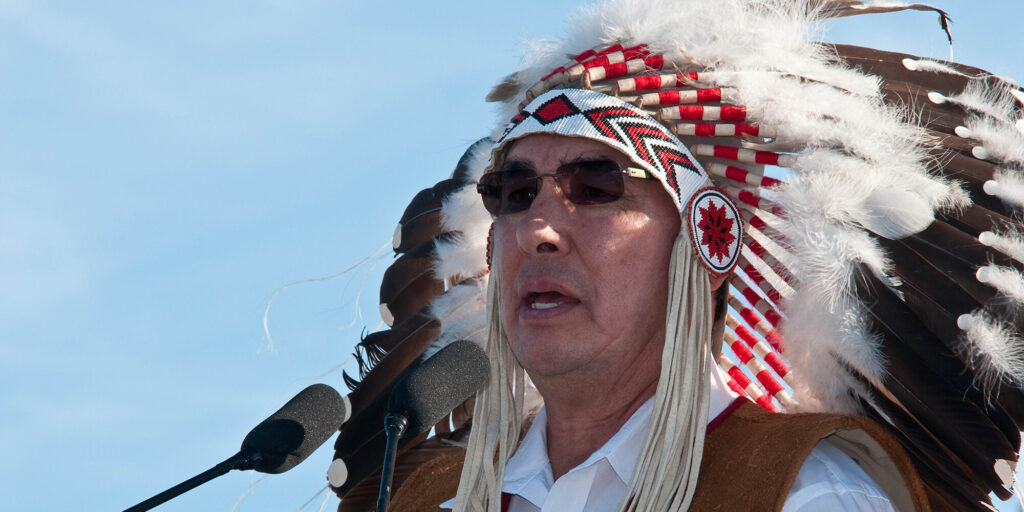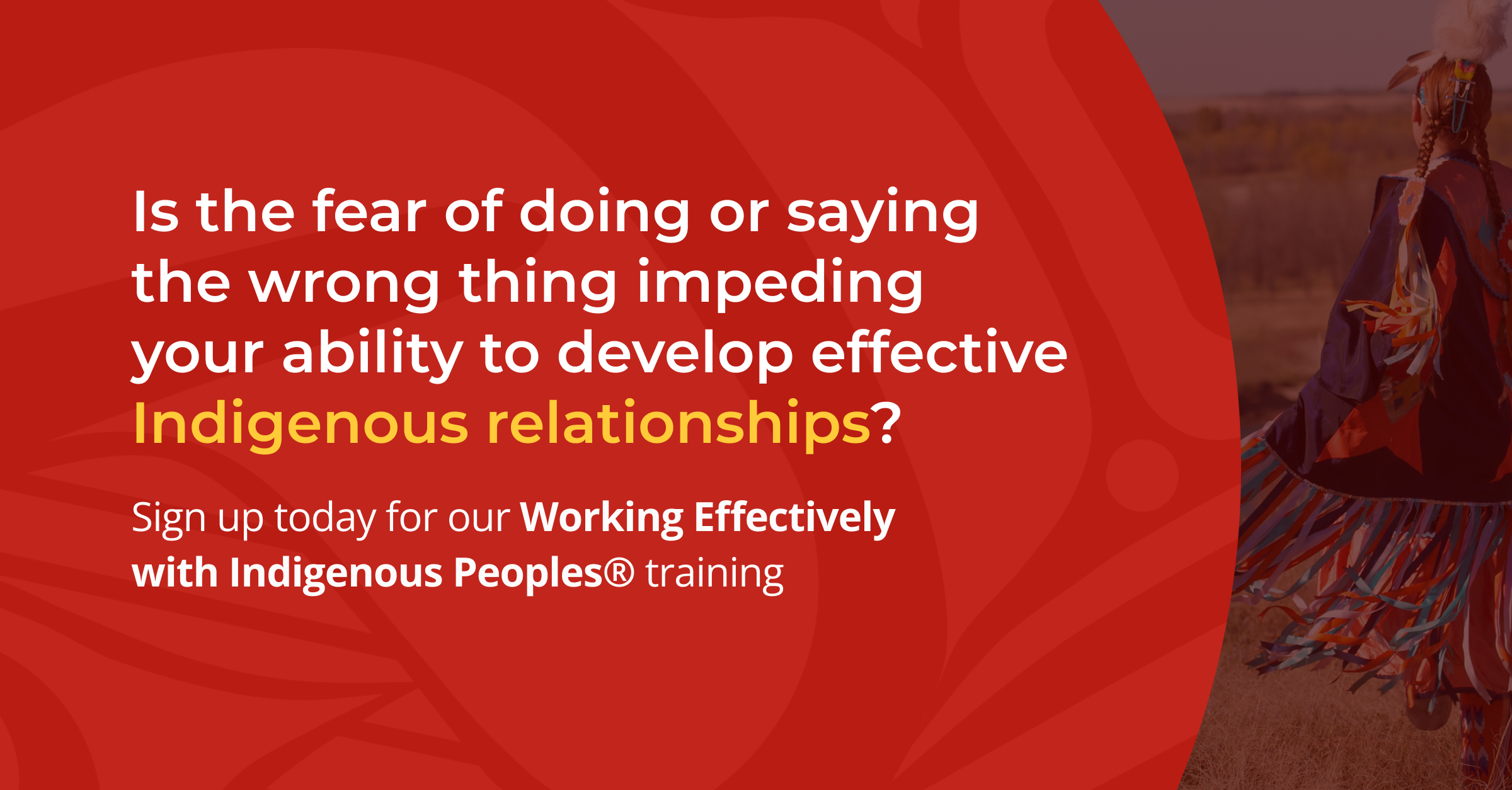Anyone aware of the work, life, and growing legacy of J. Wilton Littlechild will know that he is a significant leader in international Indigenous law and the pursuit of reconciliation between Indigenous peoples and the country of Canada.
Known fondly as “Willie”, Littlechild is an honorary Cree chief, lawyer within the Ermineskin reserve, and fervent advocate for sports and education. Alongside holding many significant leadership positions, Willie contributed to writing the United Nations Declaration on the Rights of Indigenous Peoples (UNDRIP), was a Member of Parliament for Wetaskiwin, and continues to be a critical leader in Canada’s journey towards Truth & Reconciliation.
Willie Littlechild’s Early Life & Residential School Experiences
Born in 1944 within the Ermineskin Cree Nation, Littlechild was raised by his grandparents on reserve land south of Edmonton, Alberta on the traditional territory of Bear Hills or Maskwacheesihk.
At age six, Willie was forced away from his grandparents and his home and sent to the Ermineskin residential school, remaining in the system for 14 years.
“That was a very serious trauma from many perspectives,” Willie told Cultural Survival in an interview. “Whether it was the physical separation or the mental isolation from your own family, to the spiritual and cultural separation.”
Willie credits his introduction and involvement in sports as his “vehicle for survival”.
“Of all the abuses experienced, the sexual abuse and witnessing violence was an experience of severe trauma for me,” he said in the aforementioned interview. “I really had to work on myself, right to this day. In fact [sic], I still work on my own healing journey because of what happened to me at residential school.” [1]
An Impressive Journey in Education & Sports
Driven by his interest in sports, Willie received a Bachelor of Physical Education in 1967 and his Master of Physical Education in 1975 from the University of Alberta. During this time, he was a member of the university’s swimming and hockey teams while managing its football and basketball teams. His hockey career was unfortunately cut short by a broken leg caused by a skiing accident. He assumed a management role within junior hockey and founded the first all-Indigenous junior hockey team where a condition of participation was the pursuit of education.
Due to his leadership within hockey, he was offered a position within the National Hockey League’s professional hockey academy. Recognizing that many of his hockey academy colleagues were lawyers, Littlechild returned to the University of Alberta and earned his Bachelor of Law degree in 1976.
With only five law students and three practicing lawyers of Indigenous heritage in the country at the time, Willie became the first person from an Alberta Treaty First Nation to receive a law degree from his institution. The Cree Nations bestowed Littlechild with a headdress as an honorary chief, when he was given the Cree name of Mahihgan Pimoteyw (“Walking Wolf”) previously held by his grandfather.
While Willie’s pursuit of a legal degree was originally intended for a sports leadership career, he soon realized that he held a critical role on the international stage in Indigenous law.
The Start of a Long Legal & Political Career
In 1977, Littlechild started his legal practice on the Ermineskin Reserve and was part of the Indigenous delegation during the writing of the United Nations Declaration on the Rights of Indigenous Peoples (UNDRIP) [2], referring to it as “the single most important document that I have ever been associated with and the one that I am most proud of.” [3]
Between 1988 and 1993, Littlechild was the Member of Parliament for Wetaskiwin with the Progressive Conservative Party of Canada. In 1988, he founded the International Organization of Indigenous Resource Development, advocating for treaties in Canada’s Constitution and holding the Crown accountable for treaty violations. In 1999, Littlechild was made a member of the Order of Canada, to be later promoted to Companion of the Order of Canada in 2023 [4].

In 2006, Littlechild was given the Distinguished Service Award from the Canadian Association of Former Parliamentarians. He was appointed to the Truth & Reconciliation Commission in 2009 and over six years, was part of a team that collected over 7000 video statements of people’s experiences in residential schools [5]. In 2022, when Pope Francis travelled to Canada for the Catholic Church’s apology for residential schools, Littlechild gifted the Pope with a traditional headdress, which understandably received very mixed reactions from Indigenous peoples across Canada [6].
In 2014, Littlechild was honoured with the Alberta Order of Excellence [7], followed by the 2015 Indspire Award for Law & Justice [8]. In 2016, he was nominated by the Chiefs of the Confederacy of Treaty Six First Nations to become Grand Chief, making him the first “non-sitting” Chief to have this leadership role, which he’d hold for three years [9].
Littlechild’s Continued Dedication to Sports
With a continuous dedication toward sports, Willie’s vision for international Indigenous games was realized when the first North American Indigenous Games (or “NAIG”) was held in Edmonton, Alberta in 1990. Littlechild was also involved in the Indian Sports Olympics (INSPOL), the World Indigenous Nations Games (WIN Games), and the Canada Senior Games.
He has won over 70 regional, provincial, national, and international swimming championships and his contributions to sport have been recognized through inductions into seven sports halls of fame across the globe.
In 2010, Willie was the first Indigenous Torchbearer at the Vancouver Olympic games, again with mixed reactions within Indigenous communities. He remains a passionate advocate for Indigenous inclusion in international sports, telling CBC in 2018: “What sport did for me in my own life, I wanted to give it back to students on the reserves or in our Indigenous communities. [10]”
Edmonton Oilers fans will recognize Willie Littlechild from the screens of Rogers Place, delivering a land recognition video welcoming hockey fans to Treaty Six territory since 2021.
“The recognition of our history on this land is an act of reconciliation, and we honour those who walk with us,” he says in the video that precedes the singing of “O Canada” at Oilers games [11].
The Impact of Willie Littlechild’s Life and Legacy
Littlechild’s story portrays a life-long pursuit of seeing positive relations between Indigenous communities and Canada’s governments and citizens.
Indigenous Corporate Training and the Indigenous Relations Academy offer non-Indigenous people the opportunity to learn more about the history of Indigenous Relations with the country of Canada. It provides a means for citizens to embrace their collective responsibility to work toward truth and reconciliation on the lands they inhabit.
Indigenous Relations Academy offers in-person and online self-guided training courses, including Working Effectively with Indigenous Peoples®, Indigenous Consultation & Engagement, and How to Negotiate with Indigenous Peoples, among many others.
“This story is not an Indigenous or an Aboriginal story, it’s actually Canada’s story,” Honourary Chief Willie Littlechild told Cultural Survival. “The challenge we have is having Canada become engaged fully with the story. That’s when you are going to see reconciliation happen fully. [1]”
[1] Lift Each Other Up: An Interview with Chief Wilton Littlechild, commissioner for the Truth and Reconciliation Commission of Canada. (2011, April 9). Cultural Survival.
[2] Joseph, B. (2023, September 27). The UN Declaration and Consent-Based Consultation. Indigenous Corporate Training Blog.
[3] Copley, John. (2015, June 17). Chief Wilton Littlechild: Truth and Reconciliation Commission was a life-changing experience. Alberta Native News.
[4] The Governor General of Canada. (n.d.) Mr. J. Wilton Littlechild.
[5] NCTR – National Centre for Truth and Reconciliation. (2021, April 6). Message from the President and Commissioners.
[6] Thompson, D. (2022, July 25). Indian country responds to Pope Francis receiving a headdress during ‘Pilgrimage of Penance.’ Native News Online.
[7] The Alberta Order of Excellence. (2024, July 12). Wilton Littlechild. Alberta.ca.
[8] Indspire. (2020, September 23). Dr. Wilton Littlechild – Indspire.
[9] Wilton Littlechild officially accepts position of Grand Chief of Treaty Six Nations. (2016, December 6). Alberta Native News.
[10] Bell, D. (2018, March 9). Treaty 6 Grand Chief, an award-winning athlete, wants Olympic aspirations to give Indigenous youth hope. CBC.
[11] Whyno, S., & Reynolds, T. (2024, June 20). Edmonton Oilers’ outreach to Indigenous community reaches beyond pregame video. CBC.
Featured photo: Chief Willie Littlechild during the closing ceremonies of the Truth and Reconciliation Commission National Event in Inuvik. Photo: michael_swan, Flickr (CC BY-SA 2.0)




